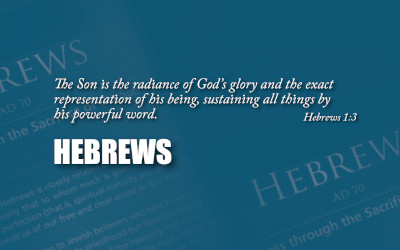Hebrews 10:1-39
NO MORE CONCIOUSNESS OF SIN. FORGIVENESS vs. OFFERING FOR SIN. ABANDON MEETINGS. NO SACRIFICE FOR SINS. ENDURE.
(Bấm vào đây để đọc tiếng Việt)
NO MORE CONCIOUSNESS OF SIN
 "1For the law possesses a shadow of the good things to come but not the reality itself, and is therefore completely unable, by the same sacrifices offered continually, year after year, to perfect those who come to worship. 2For otherwise would they not have ceased to be offered, since the worshipers would have been purified once for all and so have no further consciousness of sin? 3But in those sacrifices there is a reminder of sins year after year. 4For it is impossible for the blood of bulls and goats to take away sins. 5So when he came into the world, he said, “SACRIFICE AND OFFERING YOU DID NOT DESIRE, BUT A BODY YOU PREPARED FOR ME. 6“WHOLE BURNT OFFERINGS AND SIN-OFFERINGS YOU TOOK NO DELIGHT IN. 7“THEN I SAID, ‘HERE I AM: I HAVE COME – IT IS WRITTEN OF ME IN THE SCROLL OF THE BOOK – TO DO YOUR WILL, O GOD.’” 8When he says above, “SACRIFICES AND OFFERINGS and WHOLE BURNT OFFERINGS AND SIN-OFFERINGS YOU DID NOT DESIRE NOR DID YOU TAKE DELIGHT IN THEM” (which are offered according to the law), 9then he says, “HERE I AM: I HAVE COME TO DO YOUR WILL.” He does away with the first to establish the second. 10By his will we have been made holy through the offering of the body of Jesus Christ once for all. (Hebrews 10:1-10)
"1For the law possesses a shadow of the good things to come but not the reality itself, and is therefore completely unable, by the same sacrifices offered continually, year after year, to perfect those who come to worship. 2For otherwise would they not have ceased to be offered, since the worshipers would have been purified once for all and so have no further consciousness of sin? 3But in those sacrifices there is a reminder of sins year after year. 4For it is impossible for the blood of bulls and goats to take away sins. 5So when he came into the world, he said, “SACRIFICE AND OFFERING YOU DID NOT DESIRE, BUT A BODY YOU PREPARED FOR ME. 6“WHOLE BURNT OFFERINGS AND SIN-OFFERINGS YOU TOOK NO DELIGHT IN. 7“THEN I SAID, ‘HERE I AM: I HAVE COME – IT IS WRITTEN OF ME IN THE SCROLL OF THE BOOK – TO DO YOUR WILL, O GOD.’” 8When he says above, “SACRIFICES AND OFFERINGS and WHOLE BURNT OFFERINGS AND SIN-OFFERINGS YOU DID NOT DESIRE NOR DID YOU TAKE DELIGHT IN THEM” (which are offered according to the law), 9then he says, “HERE I AM: I HAVE COME TO DO YOUR WILL.” He does away with the first to establish the second. 10By his will we have been made holy through the offering of the body of Jesus Christ once for all. (Hebrews 10:1-10)
Those who approach God in worship are expected to be perfect, yet the repetitive acts of offering sacrifices year after year fail to achieve perfection. Even expressions of contrition fall short, as success in these endeavors would grant practitioners “no further consciousness of sin.”
This is why God rejects these inadequate methods of appeasement, as expressed in the statement: “SACRIFICES AND OFFERINGS and WHOLE BURNT OFFERINGS AND SIN-OFFERINGS YOU DID NOT DESIRE NOR DID YOU TAKE DELIGHT IN THEM.”
However, God does provide a means to attain perfection for worship: “we have been made holy through the offering of the body of Jesus Christ once for all.”
In essence, personal efforts cannot achieve holiness; one may attempt countless times to purify themselves to no avail. It is only through Christ’s sacrifice on the cross that true holiness is attained.
FORGIVENESS vs. OFFERING FOR SIN
“11And every priest stands day after day serving and offering the same sacrifices again and again – sacrifices that can never take away sins. 12But when this priest had offered one sacrifice for sins for all time, he sat down at the right hand of God, 13where he is now waiting until his enemies are made a footstool for his feet. 14For by one offering he has perfected for all time those who are made holy. 15And the Holy Spirit also witnesses to us, for after saying, 16“THIS IS THE COVENANT THAT I WILL ESTABLISH WITH THEM AFTER THOSE DAYS, SAYS THE LORD. I WILL PUT MY LAWS ON THEIR HEARTS AND I WILL INSCRIBE THEM ON THEIR MINDS,” 17then he says, “THEIR SINS AND THEIR LAWLESS DEEDS I WILL REMEMBER NO LONGER.” 18Now where there is forgiveness of these, there is no longer any offering for sin.19Therefore, brothers and sisters, since we have confidence to enter the sanctuary by the blood of Jesus, 20by the fresh and living way that he inaugurated for us through the curtain, that is, through his flesh, 21and since we have a great priest over the house of God, 22let us draw near with a sincere heart in the assurance that faith brings, because we have had our hearts sprinkled clean from an evil conscience and our bodies washed in pure water. 23And let us hold unwaveringly to the hope that we confess, for the one who made the promise is trustworthy. 24And let us take thought of how to spur one another on to love and good works, 25not abandoning our own meetings, as some are in the habit of doing, but encouraging each other, and even more so because you see the day drawing near. 26For if we deliberately keep on sinning after receiving the knowledge of the truth, no further sacrifice for sins is left for us, 27but only a certain fearful expectation of judgment and a fury of fire that will consume God’s enemies.” (Hebrews 10:11-27)
How do Christians typically handle moments of wrongdoing? They often engage in penances or acts of contrition. However, negative feelings about oneself can also arise from life situations, prompting a search for relief. All these acts of contrition can be collectively referred to as “offerings for sin.”
Yet, verse 18 emphasizes that such acts are no longer necessary for a crucial reason: forgiveness, as stated in the verse:
Where there is forgiveness, there is no longer any offering for sin. (Hebrews 10:18)
Furthermore, God declares: “THEIR SINS AND THEIR LAWLESS DEEDS I WILL REMEMBER NO LONGER.”
Need you remind God what he has decided to remember no longer?
ABANDON MEETINGS
“25not abandoning our own meetings, as some are in the habit of doing, but encouraging each other, and even more so because you see the day drawing near.” (Hebrews 10:25)
We often envision meetings as gatherings for singing, Scripture readings, sermon listening, or similar activities. However, is the author suggesting a general gathering, or is there a specific purpose behind it? I contend that the emphasis is on meeting for a particular purpose—to mutually encourage one another on the crucial subject presented in this book.
For me, the most significant form of gathering is during Sunday School, where I can openly discuss important Scriptural topics without any awkwardness. Initiating profound spiritual conversations outside of this context can be challenging.
NO SACRIFICE FOR SINS
“26For if we deliberately keep on sinning after receiving the knowledge of the truth, no further sacrifice for sins is left for us, 27but only a certain fearful expectation of judgment and a fury of fire that will consume God’s enemies.” (Hebrews 10:26-27)
Persistently engaging in intentional sinning is an unavoidable reality for all descendants of Adam. Consequently, for those who still abide by the law, there is no additional sacrifice available for sins. Their only prospect is anticipating judgment and facing the fiery wrath destined for God’s adversaries. God’s adversaries are individuals who resist placing complete trust in the efficacy of Christ’s blood and persist in employing alternative methods to address sins.
The key takeaway is to transition to the New Covenant, where sins are addressed once and for all.
ENDURE
“28Someone who rejected the law of Moses was put to death without mercy on the testimony of two or three witnesses. 29How much greater punishment do you think that person deserves who has contempt for the Son of God, and profanes the blood of the covenant that made him holy, and insults the Spirit of grace? 30For we know the one who said, “VENGEANCE IS MINE, I WILL REPAY,” and again, “THE LORD WILL JUDGE HIS PEOPLE.” 31It is a terrifying thing to fall into the hands of the living God. 32But remember the former days when you endured a harsh conflict of suffering after you were enlightened. 33At times you were publicly exposed to abuse and afflictions, and at other times you came to share with others who were treated in that way. 34For in fact you shared the sufferings of those in prison, and you accepted the confiscation of your belongings with joy, because you knew that you certainly had a better and lasting possession. 35So do not throw away your confidence, because it has great reward. 36For you need endurance in order to do God’s will and so receive what is promised. 37For JUST A LITTLE LONGER AND HE WHO IS COMING WILL ARRIVE AND NOT DELAY. 38BUT MY RIGHTEOUS ONE WILL LIVE BY FAITH, AND IF HE SHRINKS BACK, I TAKE NO PLEASURE IN HIM. 39But we are not among those who shrink back and thus perish, but are among those who have faith and preserve their souls.” (Hebrews 10:28-39)
The author of the letter urges the Hebrew Christians to recall the past, “remember the former days when you endured a harsh conflict of suffering after you were enlightened,” emphasizing the challenging period they faced after they were “enlightened,” embracing faith in Christ and departing from the Old Covenant’s sacrificial system.
This enduring conflict persists to the present day. However, contemporary Christians appear less adept at recognizing the distinction compared to the Hebrews. While they acknowledge Christ’s sacrifice for their sins, they also feel compelled to make sacrifices or engage in acts of personal contrition. A thorough examination of the book of Hebrews reveals that God does not permit the coexistence of these two systems.
Nghi Nguyen
- Scripture quoted by permission. All scripture quotations, unless otherwise indicated, are taken from the NET Bible® copyright ©1996-2006 by Biblical Studies Press, L.L.C. All rights reserved.
Disclaimer: This is my own opinion on the topic, which does not necessarily reflect the church's theology, or beliefs of the individuals in it — Nghi Nguyen
